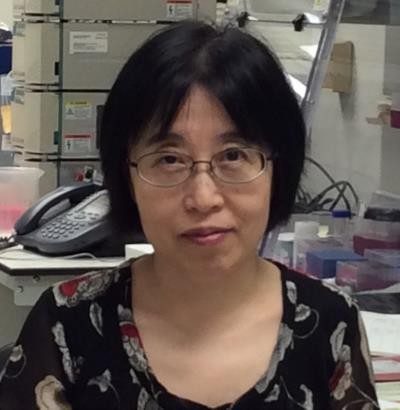Lab Members

Shulin Li, Ph.D.
Principal investigator, Professor
SLi4@MDAnderson.org
Professor, Department of Pediatrics - Research, Division of Pediatrics, MD Anderson
W. T. and Louise Jarrett Moran Distinguished Chair in Pediatric Oncology, Department of Pediatrics - Research, Division of Pediatrics, MD Anderson
Postdoctoral Fellow, Molecular Immunology, Experimental Therapeutics, MD Anderson, 1993-1997
Ph.D., Cell Wall Biology, Washington State University, Pullman, WA, 1993
B.S., Biological Science, Shanxi State University, Shanxi, China, 1985

Summer Xia, M.S.
Research Laboratory Coordinator
XXia1@MDAnderson.org
M.S. Washington State University, 1993
Summer is providing central support to laboratory members for molecular assays, molecular cloning and gene structure design, which are routinely needed for understanding biological questions and developing novel immune therapy. Her other role is to coordinate laboratory operations.

Jiemiao Hu, Ph.D.
Assistant Professor
JHu1@MDAnderson.org
Ph.D., MD Anderson Cancer Center UTHealth Houston Graduate School of Biomedical Sciences, 2012
Jiemiao’s research focuses on delivering T cells, tumor infiltrating lymphocytes (TILs) and chimeric antigen receptor (CAR) T cells into solid tumors. She discovered that the combination of certain chemotherapy and immunotherapy facilitates the penetration of T cells into human xenograft and PDX solid tumors. Further, such therapeutic strategy greatly enhances the effector T cell functions, and therefore boosts the immune surveillance in tumor microenvironment, resulting in tumor remission and extended survival. This novel approach to delivering T cells may broaden the application of T cell therapy to a wider range of solid tumors.
Hobbies: Zumba, hiking, music and playing with dogs
Hometown: Beijing, China

Zhiliang Jia, Ph.D.
Research Scientist
ZJia@MDAnderson.org
Ph.D., Cancer Biology, MD Anderson Cancer Center UTHealth Houston Graduate School of Biomedical Sciences, 2010
Zhiliang is interested in developing and testing immune therapies for pediatric cancer on a humanized mouse model. Mouse models with human immune cell engraftments represent a ground-breaking platform to evaluate treatments of cancer. Replacement of mouse genes with human genes can target the gene and subsequently the functional protein molecule. In mice that have a reconstituted human immune system, interaction of human immune cells with tumor cells can be determined, and experimental results produced from this system will be more relevant and promising.

Sheng Zhang, M.D., M.S., Ph.D.
Senior Research Scientist
SZhang16@MDAnderson.org
Sheng’s research focuses on the new drugs and immunotherapies of small molecular inhibitors, therapeutic antibodies, ADC, chimeric antigen receptor cells such as CAR-T, CAR-NK, and CAR-NKT, tumor infiltrating lymphocytes, tumor cell vaccines, etc. He collaborates with different investigators in the biomedical discovery. His studies will apply different novel approaches and strategies in the future treatments of human diseases.
